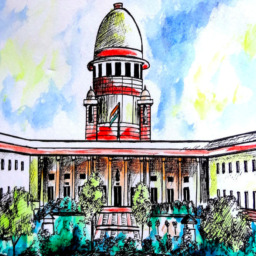INTRODUCTION
The case is a turning point in the history of the Indian Environmental Law perspective. This case is regarded as one of the most significant and historical judgments. The Supreme Court construed the “Public Trust Doctrine” in a commendable manner, allowing it to apply in India. Apart from this, it also aided in establishing the ‘Polluter Pay Principle’ and ‘Principle of Deterrence’. The notion of the Public Trust Doctrine states that the sovereign holds in trust for public use resources such as land, sea, air, forests, regardless of any private property ownership. Resources like land, sea, air, and forests belong to mankind and are shared by them as a whole. These natural resources are believed to be a gift of nature. These are held in the public trust by the government. Hence, the resources can’t be owned and used by any private institution. The government is not allowed to distribute certain resources which fall under the public trust doctrine to any private institution for commercial use.
FACTS
‘Span Motels Private Limited.’ was a private company controlled by the owners of Span Resorts that launched a new project by the name of “Span Club”, which was built on the bank of the river. A famous newspaper called the “Indian Express” published an explosive article titled “Kamal Nath dares the mighty Beas to keep his dreams afloat” which disclosed issues with the construction of the Span Club. After the article was published, it was discovered that the ‘then Minister of Environment and Forests’. Mr Kamal Nath had a direct connection with the Span Motel Case.
By letter dated November 24, 1993, the Ministry of Environment and Forests gave its prior consent to the company leasing around 27.12 bighas of additional forest land (dated April 11, 1994). This approval gave the owners of the company permission to build their ambitious project, named “Span Club”, which led to the overrunning of the swollen river. Also, due to the pressure from the use of bulldozers, tractor trolleys, and earthmovers, which were used to construct heavily cemented embankments along the river, which led to a change in the swollen Beas river’s course, this also led to the washing away of the adjoining lawns. An extraordinary flood caused by the Beas River in 1995 destroyed property worth around 105 crores.
ISSUES
- Was the construction undertaken by the Span Motels Pvt. Ltd. company legal and justified?
- Whether Mr Kamal Nath was wrongly made accused by the court?
- Whether the “Public Trust Doctrine” is applicable in India or not?
ARGUMENTS OF THE PETITIONER
The petitioner argued that this construction disturbed the ecological balance of the environment and damaged the natural conditions of forest land, river, and air, which are gifts from nature, and would be viewed as a violation of the fundamental right guaranteed under Article 21. This would further lead to the violation of Article 51A (g).
Article 21 deals with“Protection of life and personal liberty.” The Right to life also involves nature and the environment in its definition, without which life cannot be lived in a healthy way with joy and happiness. So, it has become the fundamental right of every citizen of India to live a healthy life without any pollution in the environment.
Article 51A (g)states: “The duty of every citizen to look after the environment.” It’s the duty of every citizen of India to keep and protect the environment because any disturbance in any of the natural elements that are necessary to lead a life would be dangerous for the lives of all the citizens of the country.
ARGUMENTS OF THE RESPONDENT
Mr Kamal Nath refuted the allegations against him. M.C. Mehta had wrongfully accused him, he claimed. He argued that the allegations were baseless, which were made in the press reports. They are exaggerated and mala fide and have been published to ruin his reputation. It was also argued that the construction was carried out on land under Span Motel’s ownership. The surrounding area was built to preserve the aforementioned land from future floods.
JUDGEMENT
In court, this case was judged by a 2-judges bench, who ordered and directed that: After a long discussion, the court granted the “Public Trust Doctrine” in this case. The public trust doctrine, as mentioned by the judges during the judgment should be considered as a part of the Land laws. The prior approval, which was granted by the Ministry of Environment and Forests, and the lease deed in respect of an area of 27.12 bighas in favour of the company, were quashed by the court. The Himachal Pradesh Government was directed to take charge of the area and restore it to its primary natural and environmental conditions. The motel was directed by the court to pay the cost of compensation for the restitution of the environment and ecology under the Polluter Pay Principle.
The court ordered that the pollution caused by the construction of the motel on the banks of the Beas River be reversed and removed. It was directed that NEERI should check the pollution control plans regulated by the motel. The motel was required to build a 4-meter-long boundary wall for its construction, beyond which they were not permitted to use the river basin’s property. The Motel even should not utilize a single part of the river basin. The river basin should be left untouched from the Motel’s boundary wall. The bank & basin of the river should be left open for the general public use. The motel was not permitted to discharge the untreated waste into the river. The Board was directed to examine all the hotels/institutions/factories within the location of Kullu-Manali and simply just in case any of them gets caught red-handed for discharging untreated waste into the river, the Board should take strict actions against them as per the law. The Motel through its management should show the cause of why an additional pollution fine is not obligatory on the Motel. NEERI was directed to submit the reports by 17th December 1996 which would be listed on 18th December 1996. The writ petition was disposed of except for the restricted purpose indicated above.
CASE ANALYSIS
The lawsuit demonstrated how Mr Kamal Nath (Minister of the environment and forest department) misused his power, causing environmental degradation, harm, and pollution. He gave his first priority to his financial interests and put them all above his responsibilities and duties towards the nation’s natural resources. In the matter of the case, it was discovered that Kamal Nath was personally involved with the motel as he used to share a majority of shares in the private motel company. His selfishness and misuse of power resulted in property damage worth around 105 crores. The damage was caused by an unusual flood, which was the result of the ongoing construction by the motel company on the river bank. MC Mehta filed a PIL against Mr Kamal Nath. In the court, after so many arguments and long hearings, the court made a historical judgement that allowed applicability of the Doctrine of public trust principle in India. Lastly, with a happy note, The Indian Judiciary gave Justice to the environment and its natural resources which the ministry of forest and the environmental department failed to do.
CONCLUSION
M.C. Mehta v. Kamal Nath & Ors. is an important landmark case. This case gave birth to a new concept in India, which is the applicability of the “Public Trust Doctrine” principle. Other than this principle, two other principles were rightfully applied in the case, which was equally important under Environmental Law. The “Polluter Pay Principle” was applied when the court directed the motel to pay the cost of compensation. On the other hand, the “Principle of Deterrence” was applied when the court imposed exemplary damages on the motel.
The doctrine of public trust provides the basis for an increase in the efficiency and effectiveness of the impact of the Indian Environmental Laws. It also directs the state to protect and look after the ecological and environmental resources that are gifted by our mother nature. They must be preserved, protected, and respected. It made it a duty of the citizens of India to protect their environment from any damage, as it is a fundamental right for every citizen to live in a healthy environment. This doctrine plays a vital role in the protection of the environment. The judgement not only upheld environmental justice for nature, but it also transplanted a successful and important part of environmental law in the country in order to save nature. After this judgment, it made it easier for the judiciary to give judgments on environmental cases like Th. Majra Singh v. Indian Oil Corporation and M.I. Builders v. Radhey Shyam Sahu.
Author(s) Name: Archita Sengupta (Xavier Law School, St. Xavier’s University, Kolkata)
















